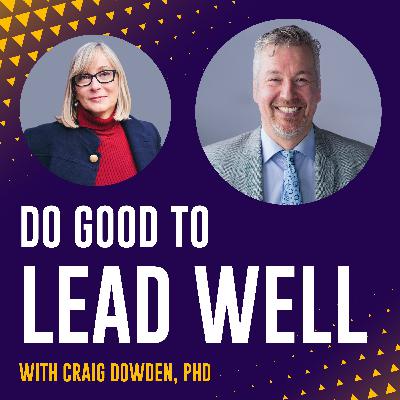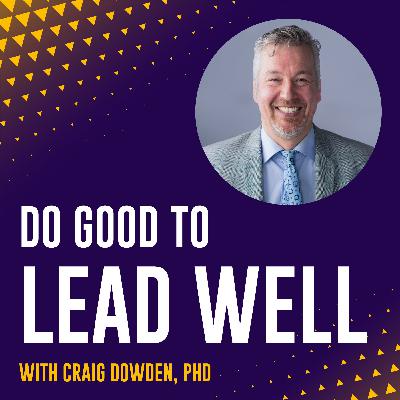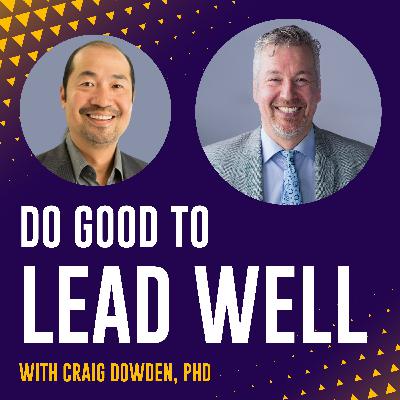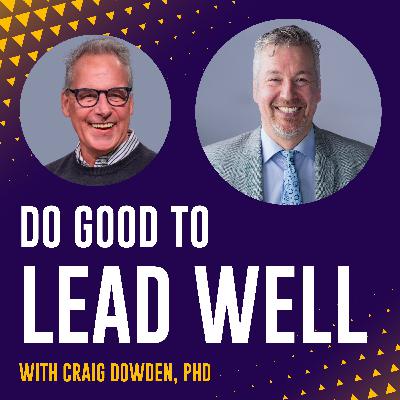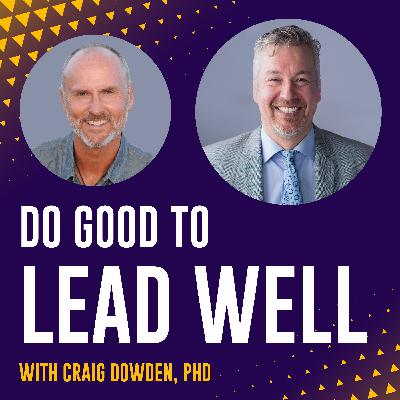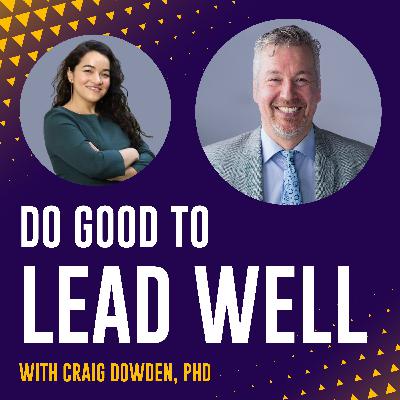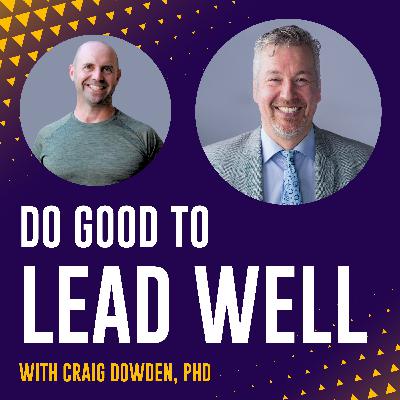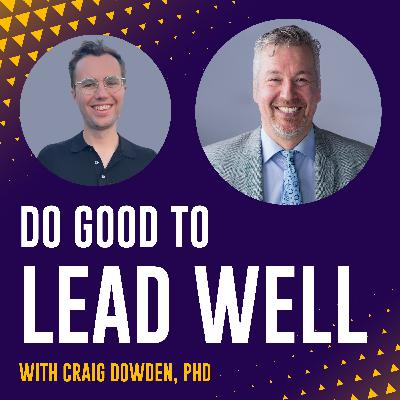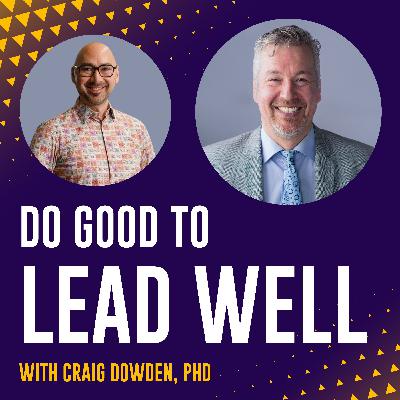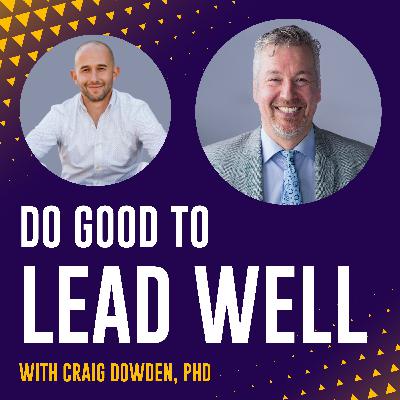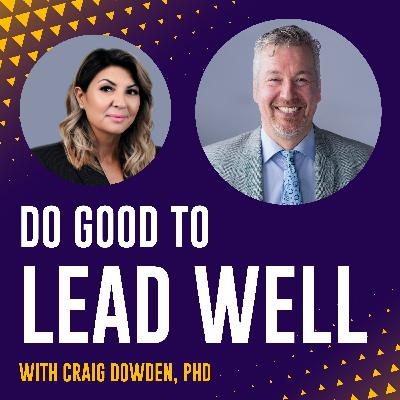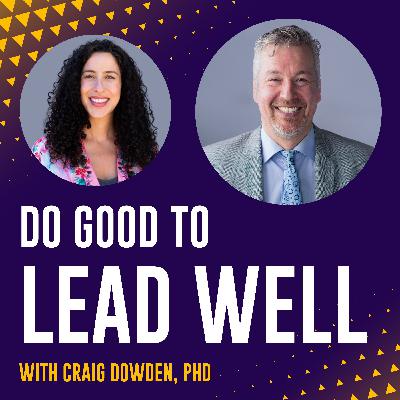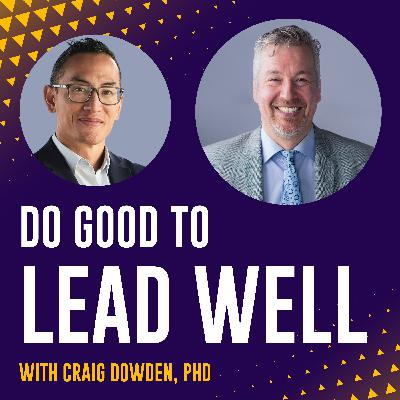Discover Do Good To Lead Well with Craig Dowden
Do Good To Lead Well with Craig Dowden

Do Good To Lead Well with Craig Dowden
Author: Craig Dowden
Subscribed: 13Played: 269Subscribe
Share
© Craig Dowden
Description
If you're passionate about mastering self-leadership, you're in the right place. I've dedicated my career to understanding the science and practice of positive leadership. I Integrate evidence-based principles from the fields of positive psychology with those in leadership and organizational excellence that will help you develop real-life solutions to solve your greatest challenges. Each week I'll bring world-class content with industry experts to help you use positive leadership to build a peak performance culture.
178 Episodes
Reverse
Join us for an enlightening discussion as we explore the intersection of hospitality and leadership with our latest guest, Taylor Scott. Taylor, an accomplished author, keynote speaker, and leadership development consultant, shares insights from his rich career spanning Disney Parks and Resorts, Gaylord Hotels, and Las Vegas landmarks like Wynn and the Cosmopolitan. He reveals the inspiration behind his latest book, "Give Hospitality," a Hawaiian-themed fable that draws on real-life experiences and relationships with influential leaders. Listen in as we discuss the art of storytelling and its power to convey essential leadership principles, while Taylor highlights the role of mentors and personal connections in shaping his narrative.Discover the transformative essence of hospitality in leadership as we reflect on its role in creating welcoming and inclusive environments. Inspired by a memorable pre-opening speech at Gaylord Palms Resort, we explore how the spirit of hospitality can bridge divides in both personal and professional settings. This conversation emphasizes the importance of generosity, kindness, and the spirit of Aloha in fostering meaningful relationships and driving performance. Taylor shares personal anecdotes that illustrate the impact of empathy and authenticity in leadership, revealing how these qualities build trust and foster a culture of connection.We also touch on the importance of intentional leadership and organizational transformation, as Taylor shares his journey from Walt Disney World to the bustling scene of Las Vegas. He emphasizes the significance of gratitude and intentionality in overcoming challenges and achieving desired outcomes. In addition, we discuss the dual aspects of giving and receiving hospitality through effective feedback, underscoring the importance of dialogue and constructive conversations. Finally, we highlight the role of personal and organizational values in creating a culture of hospitality, offering practical exercises and metrics to measure success. Join us for an engaging and thought-provoking conversation that promises to inspire and inform.Key Takeaways– Hospitality is the ability to make people feel welcome, comfortable, and important, a core competency of transformational leadership that applies across all industries – Emotional connection drives behavioral change; Jonathan Haidt's "rider and elephant" metaphor shows how emotion (the elephant) provides the energy while logic (the rider) provides direction– Consistency in leadership behavior, not initial perfection, builds trust and credibility; keep showing up authentically even when facing initial skepticism – Remote leadership is possible when leaders commit to three non-negotiables: one-on-one meetings, team meetings, and strategic digital communicationChapters02:21 Guest Introduction: Taylor Scott's Background and 20-Year Hospitality Career03:54 The Inspiration Behind Give Hospitality: Hawaiian Theme and Fable Format05:25 The Story of Kauele Resort: Character Development and Core Values12:31 The GIVE Framework: Hospitality Rooted in the Spirit of Aloha14:21 Business Results and Hospitality: The Inseparable Connection Between Relationships and Performance18:33 Empathy as a Learnable Skill: Building Authentic Connection in Stressful Times21:01 Consistency in Leadership: Why Daily Behaviors Build Trust More Than Words27:33 Intentional Leadership: Vision, Mission, and Values as Accountability Anchors45:50 Leading with Hospitality in Remote and Hybrid EnvironmentsConnect with Craig Dowden and the Do Good to Lead Well PodcastWebsite: https://www.craigdowden.comGuest Contact InformationTaylor Scott: Founder Hospitality, LLCWebsite: https://www.leadwithhospitality.comLinkedIn: https://www.linkedin.com/in/tscott1502/Email: info@leadwithhospitality.comBooks:- Give Hospitality- Lead with Hospitality- Ball Games to Boardrooms
What if your team could achieve unprecedented levels of performance and accountability? Unravel the secrets of transformational leadership in our discussion with Keith Ferrazzi, a trailblazing executive team coach and New York Times bestselling author. Keith's latest book, "Never Lead Alone: 10 Shifts from Leadership to Teamship," draws from over two decades of research and thousands of team assessments, revealing strategies that have revolutionized giants like General Motors and are now shaping AI-driven transformations.Ever wondered how to turn conflict into a catalyst for creativity? Keith shares his insights on transforming organizational culture through strategic stress testing. By pioneering the use of small breakout rooms, teams can cultivate psychological safety and facilitate candid feedback. This shift from conflict avoidance to a culture of candor is not just theoretical, learn how it is being applied to achieve significant improvements in team dynamics. We delve into practical shifts and the establishment of a new social contract within teams, underscoring the potential for innovation and resilience in the face of challenges.During challenging times, how do teams not just survive, but thrive? We spotlight the resilience-building practices that Keith champions, like energy checks and gratitude circles, which have fortified teams during the pandemic. Learn from the success stories of high-performing teams, such as those at Elf Beauty, who leverage modern collaboration techniques for faster product development and competitive pricing. Keith's philosophy of "never lead alone" resonates throughout, advocating for a culture where gratitude and collective success are at the forefront. Engage with us as we embrace passion-fueled leadership and the transformative potential of team dynamics.What You’ll Learn- The Power of Co-Elevation.- Strategies for transforming team dynamics.- Building unshakeable team resilience.- Intentional leadership and collaboration in hybrid work.- Peer coaching and open 360 feedback.- Embracing gratitude and collective success to revolutionize organizational culturePodcast Timestamps(00:00) - Leadership Strategies for High Performing Teams(09:58) - Transforming Organizational Culture Through Stress Testing(16:33) - Rewriting the Social Contract(29:39) - Building Team Resilience and Culture(45:36) - Leadership as a Core PassionKEYWORDSPositive Leadership, Team Dynamics, Co-elevation, High Performance, Accountability, Stress Testing, Organizational Culture, Conflict Avoidance, Candid Feedback, Social Contract, Resilience, Creativity, Energy Checks, Gratitude Circles, Modern Collaboration, Positive Focus, Collective Success, Passion, Engagement, CEO Success
“Great leadership starts with great self-leadership” is a mantra that lies at the heart of the Do Good to Lead Well podcast. This is why I am thrilled to share this episode, where I welcome Margaret C. Andrews, a seasoned executive and leadership expert, who shares the intriguing backstory behind her book, Manage Yourself to Lead Others, which was inspired by a pivotal moment when she was told she lacked self-awareness. This experience led her to explore the vital connection between understanding oneself and effective, sustainable leadership.Listen in as we guide you through an enlightening exercise to reflect on the traits of your best boss, revealing that a remarkable 85% of these qualities fall under the realm of soft skills or emotional intelligence. Margaret and I address a listener's question on self-awareness, offering methods like 360-degree feedback to gain a clearer understanding of one's impact. The episode continues to explore the challenges of addressing self-awareness and providing constructive feedback, using the SBI (Situation, Behavior, Impact) model to enhance clarity and constructiveness. Our discussion invites you to reconsider what truly makes a great leader and the critical role of empathy and effective communication in leadership.Enhancing team dynamics is also a focal point of our conversation, with insights into creating personal user manuals and team charters to foster effective teamwork. Margaret shares strategies for transitioning from a subject matter expert to leading a team, emphasizing the importance of intentional leadership. We explore managing up with a boss who lacks self-awareness, highlighting self-care and mental health as crucial components of professional success. As we conclude, we underscore the importance of self-awareness in how we perceive our intentions versus how others feel our impacts, advocating for a mindful approach to leadership that balances transparency and resilience.What You’ll Learn- The power and importance of self-awareness in effective leadership.- How to enhance emotional intelligence for better team dynamics.- Leveraging 360-feedback for professional development.- Techniques for delivering impactful and constructive feedback.- Ways to align intentions with actions to foster trust within a team.- Methods to build resilience in personal and professional settings.Podcast Timestamps(00:00) – Manage Yourself to Lead Others(09:48) – Soft Skills Are the Heart of Great Leadership(16:55) – Navigating Feedback Conversations to Build Self-Awareness(25:04) – Managing Up(38:37) – Share Your User Manual(42:22) – The Power of Team Charters(47:15) – Vulnerability and Building Resilience(56:16) – Intentions Versus Impacts KEYWORDSPositive Leadership, Self-Awareness, Emotional Intelligence, Team Dynamics, Feedback, Personal Growth, Communication, Resilience, Soft Skills, Mental Health, Vulnerability, Transparency, Leading with Intention, Fostering Collaboration, User Manuals, Team Charters, CEO Success
Is empathy truly a superpower in leadership, or does its endless demand threaten to drain the very leaders we rely on? Join me for this month’s solo episode, as I explore the answer to this important question. As leaders are constantly called upon to exercise empathy, their reserves can run dry, leading to avoidance of hard conversations and emotional exhaustion. Together, we will confront these challenges, recognizing and normalizing our emotional limits while sharing practical strategies to safeguard our empathy reserves.This episode invites you to reflect on the multifaceted nature of empathy and its powerful role in both our personal and professional lives. We highlight the importance of maintaining empathy in a sustainable way, ensuring leaders can continue to show up with care and accountability. By prioritizing our own well-being, we also model healthy emotional boundaries for those we lead. Tune in to examine how balancing empathy with strategic foresight and ethical clarity can drive success for individuals and organizations alike.What You’ll Learn- Dynamic strategies to conquer empathy fatigue- Techniques to seamlessly balance emotional labor with strategic thinking- How to establish robust boundaries- Ways to achieve lasting emotional resilienceKEYWORDSPositive Leadership, Empathy, Empathy Fatigue, Strategic Thinking, Ethical Decision-Making, Executive Excellence, Setting Boundaries, Compassion Fatigue, Emotional Labor, Emotional Resilience, Sustainable Empathy, CEO Success
Join us for an enlightening exploration of purpose-driven leadership as we welcome Andrew Lo, President and CEO of Embark, to the Do Good to Lead Well podcast. Discover how Embark is transforming how families plan, save, and invest in their children's education through innovative initiatives like their new gifting program for Registered Education Savings Plans (RESPs). This program allows grandparents and others to contribute to a child's education fund during the holidays.Andrew also shares the intricacies of building a purpose-driven, collaborative environment. Discover how Embark measures success through customer satisfaction and trust, and how reinvesting their earnings into educational initiatives supports young entrepreneurs. Andrew's stories of experimentation, resilience, and mental well-being underscore the importance of nurturing a culture where innovation thrives and collective success is prioritized.As we explore the transformative journey of fostering a learning culture, Andrew shares strategies for encouraging lifelong learning and innovation within his organization. From participation in international conferences to hackathons, Embark promotes creativity and problem-solving across all levels. We also address the challenges of maintaining accountability while nurturing a positive organizational culture, emphasizing the importance of empowerment and open communication. With a focus on building resilience and mental well-being, this episode provides valuable insights for leaders navigating the complexities of the modern business landscape, especially in the AI era. Tune in for an inspiring conversation that highlights the human connection at the heart of leadership and innovation.What You’ll Learn- The heart of purpose-driven leadership- The secrets to collaboration- How to foster a learning culture- Empowering accountability and growth- Why you want to lead with consensus when defining organizational success- Building resilience and mental well-being- Leadership in the digital and AI eraPodcast Timestamps(00:00) - Purpose-Driven Leadership in Education(08:45) – The Qualities of Great Leaders(17:15) – The Secrets to Effective Collaboration(25:49) - Empowering Accountability for Organizational Growth(32:10) - Building Resilience and Mental Well-Being(38:49) – The Motivational Power of a Truly Shared Definition of Success(52:27) - Leadership in the AI EraKEYWORDSPositive Leadership, Leading with Purpose, Purpose-Driven Leadership, Innovation, Financial Literacy, Social Impact, Collaboration, Customer Satisfaction, Trust, Corporate Scorecard, Young Entrepreneurs, Learning Culture, Lifelong Learning, Hackathons, Curiosity, Accountability, Empowerment, Organizational Growth, Mental Well-Being, Resilience, Fear of Failure, Burnout, Hybrid Work Environments, Strategic Planning, AI Era, Soft Skills, Emotional Intelligence, Human Connection, CEO Success
Unlock the secrets to peak performance and human-centered leadership with Mark C. Crowley, a trailblazer in the field and bestselling author, as he joins the "Do Good to Lead Well" podcast. Discover how prioritizing employee well-being over conventional engagement metrics is transforming organizations globally. Mark's latest book, "The Power of Employee Well-Being," challenges the status quo by asking us to redefine what team flourishing really looks like while providing an evidence-rich and practical roadmap to make it happen.Our conversation begins by encouraging organizations to shift from outdated annual engagement surveys to the immediacy of pulse surveys, uncovering their impact on leadership accountability and organizational responsiveness. Mark also highlights the necessity of leadership commitment to move beyond performative measures, ensuring initiatives are authentic and impactful.As hybrid workspaces become the standard, we discuss the critical importance of fostering connection and a sense of belonging, regardless of physical location. From maintaining and deepening the quality of relationships through regular one-on-one meetings to using office time to build social ties, we explore strategies for hybrid success. Plus, with the rising influence of AI, we emphasize the need for transparency and empathy in workforce management, ensuring that technological advancements do not compromise our humanity. Join us in this enlightening episode full of actionable, scientifically supported insights and strategies for leaders committed to driving success by leveraging the power of employee.What You’ll Learn- The importance of prioritizing employee well-being in leadership.- How pulse surveys can provide valuable insights into employee satisfaction.- The vital role of leadership commitment in realizing the power of employee well-being.- Strategies for successfully managing hybrid workplaces.- The transformative impacts of AI on modern workplaces.- The role of authentic engagement in driving organizational success.Podcast Timestamps(00:00) – The Failure of Employee Engagement(09:27) - Transforming Organizations Through Pulse Surveys(16:40) - The Impact of Employee Well-Being(21:18) - Friendship and Belonging at Work (102 Seconds)(36:40) - Leading With Love in Leadership(44:24) - Creating Connection in Hybrid Workplaces(50:24) – Employee Well-Being in an AI WorldKEYWORDSPositive Leadership, Human Leadership, Employee Well-Being, Organizational Success, Engagement Surveys, Pulse Surveys, Workplace Happiness, Hybrid Workplaces, AI, Transparency, Leading with Empathy, Continuous Learning, Fostering Connection, Increasing A Sense of Belonging, Remote Work, Self-Leadership, CEO Success
Join us on this engaging episode of the Do Good to Lead Well podcast, where we explore the fascinating journey of Dr. Michael Nevarez, a highly respected psychiatrist and leadership coach. His insights, drawn from his work as the assistant director of the Harvard Study of Adult Development, underscore the importance of continuous personal and leadership growth, integrating scientific research into practical tools for leaders.Listen in as we explore the art of delivering effective feedback, a crucial skill for any leader. The conversation highlights the challenges leaders face in maintaining a delicate balance between fostering growth and preserving positive relationships. Discover the significance of providing feedback that is behaviorally anchored, utilizing specific and neutral information to avoid performance declines. Dr. Nevarez shares strategies like the "push" and "pull" phases, where clarity and curiosity play pivotal roles in understanding and addressing underlying issues. By focusing on clear communication and open dialogue, leaders can better navigate the intricacies of feedback, differentiating between problems such as time management and prioritization.The episode also unpacks techniques such as affect labeling and perspective checking, emphasizing the role of psychological safety in successful implementation. Discover how managing emotions in feedback conversations can avoid common pitfalls like fundamental attribution error, utilizing tools like contrast statements to reduce perceived threats and promote constructive dialogue. If you’re looking for actionable tools and scripts for creating meaningful, growth-oriented feedback conversations, this conversation is a must-listen.What You’ll Learn- The secrets of the art of feedback.- How to master the powerful STEP communication framework.- Ways to create environments of psychological safety.- Managing emotions in feedback conversations.- Balancing candor with impact.Podcast Timestamps(00:00) – The Art and Science of Leadership Development(08:16) – Navigating the “Push” and “Pull” of Feedback Conversations(23:21) – Watch Your STEP: A Powerful Framework for Effective Communication(40:33) - Managing Emotions in Feedback ConversationsKEYWORDSPositive Leadership, The Art of Meaningful Conversation, Leadership Development, Effective Feedback, Communication Framework, STEP, Psychological Safety, Behaviorally Anchored Feedback, Curiosity, Personal Growth, Fostering Accountability, Clear Expectations, Constructive Dialogue, CEO Success
What if midlife could be the most transformative period of your life? Join us in a compelling conversation with Chip Conley, renowned entrepreneur and bestselling author, who shares his transformative insights on embracing the midlife journey. Drawing from his pivotal experiences at Airbnb and his groundbreaking work with the Modern Elder Academy (MEA), we explore how Chip's latest book, "Learning to Love Midlife," challenges ageist stereotypes and redefines midlife as a time for renewal and growth.Redefining what it means to be a "modern elder," Chip shares his unique perspective on combining wisdom with curiosity. By reframing midlife as a "midlife chrysalis" rather than a crisis, he opens up new avenues for personal transformation and fulfillment. Drawing on insights from thought leaders like Becca Levy and Arthur Brooks, Chip and I discuss how emotional intelligence, social relationships, and spirituality are key areas for growth during this pivotal life stage.Finally, we journey through the concepts of generativity and life purpose as they evolve across life's stages. Drawing from spiritual and philosophical insights, we discuss how older generations can impart wisdom while embracing new purposes, and how younger generations can navigate the complexities of an AI-driven world. We delve into the importance of understanding one's life story and finding one's "ikigai," a harmonious blend of passion, proficiency, reward, and necessity. Let this conversation inspire you to see midlife not as a time of crisis but as a powerful opportunity for growth and discovery at any age.What You’ll Learn- Why midlife is not a crisis; it’s an opportunity.- How to embrace aging as an opportunity for personal growth- Harnessing the value of wisdom gained through life experiences- The importance of fostering meaningful friendships in midlife- Strategies for redefining one's purpose during midlife transitionsTake the Midlife Pathfinder Quiz: https://reportcard.meawisdom.com/pathfinder-quizPodcast Timestamps(00:00) – Learning to Love Midlife(13:09) – Midlife as a Chrysalis, Not Crisis(18:39) – What is a Modern Elder? Harnessing Our Wisdom and Life Experience(35:26) – The Power of Friendships(43:48) – Generativity and Purpose Across Different Stages of Life: Finding Your "Ikigai"KEYWORDSChip Conley, Positive Leadership, The Art of Meaningful Conversation, Curiosity, Learning to Love Midlife, Modern Elder, Challenging Ageist Stereotypes, Cultivating Wisdom, Embracing Transformation, Continuous Growth, Positive Mindset, Social Wellness, The Power of Friendship, Living with Purpose, Generativity, Creating our Life Story, Ikigai, Hero's Journey, Emotional Intelligence, Social Relationships, Spirituality, Longevity, Adaptability, Lifelong Learning, CEO Success
Join us for an enlightening conversation this week with Zorana Ivcevic Pringle, a senior research scientist at Yale University's Center for Emotional Intelligence, as she shatters the myth of creativity as a fixed trait. Her insights from "The Creativity Choice: The Science of Making Decisions to Turn Ideas into Action" guide us through redefining creativity as a choice, empowering us to intentionally cultivate it in all aspects of life. Whether you're an artist or a business professional, Zorana's wisdom will help you recognize and harness your creative potential.We explore the (often overwhelming) challenge of managing an abundance of ideas and the art of creative problem-solving. Learn practical strategies to overcome creative blocks, such as task switching and the innovative concepts of "problem finding" and "problem construction" that encourage redefining challenges for fresh solutions. Explore the vital role of psychological safety in fostering organizational creativity. We discuss how leaders can create an environment where diverse perspectives are welcomed, and emotions are seen as valuable datapoints for decision-making. Through this lens, creativity becomes a continuous series of choices, each an opportunity for originality and innovation. Zorana's insights offer a roadmap for choosing creativity at every turn, leading to more effective and innovative outcomes. Don't miss out on this opportunity to enhance your creative journey with the tools and techniques shared in this episode.What You’ll Learn- How to redefine creativity as a conscious choice- Strategies to ignite and enhance personal creativity- Techniques to manage and overcome idea overload- Ways to foster and spark innovation within organizations- The importance of psychological safety in the creative process- Insights into unlocking and realizing one's full creative potentialPodcast Timestamps(00:01) – Creativity is a Choice(15:14) – Navigating Ideas and Creative Problem Solving(31:16) – Unleashing Organizational Creativity(42:23) – Fostering Psychological Safety for Innovation(51:56) – Creativity as a Continuous ProcessKEYWORDSPositive Leadership, Creativity, Innovation, Generating Ideas, The Power of Problem-Finding, Social Connections, Overcoming Creative Blocks, Task Switching, Psychological Safety, Organizational Creativity, Inviting Diverse Perspectives, Emotions as Data, Improving Decision-Making, Continuous Learning, CEO Success
In this week’s episode of the Do Good to Lead Well podcast, I had the pleasure of speaking with Lindsay Dodd, the CEO of Cashco Financial, for an enlightening conversation about how to build an award-winning culture. He reveals how purpose and profitability can successfully coexist, emphasizing a people-first mindset that champions dignity, trust, and empowerment. His insights showcase how Cashco Financial has consistently earned recognition as one of Alberta’s best workplaces for five consecutive years. We explore leadership not as a set of inherent qualities, but as learned behaviors such as courage, confidence, empathy, and resilience, drawing from frameworks that advocate for modeling the way and inspiring a shared vision.Our discussion delves into the true meaning of authentic leadership, defining it as a consistent commitment to building trust by aligning our actions with our values and beliefs. Lindsay illustrates how genuine vulnerability, coupled with an openness to feedback and a commitment to inclusive workplaces, strengthens bonds and fosters collaboration. We explore practical strategies for navigating challenging peer interactions, stressing the importance of curiosity and addressing issues directly yet calmly. Additionally, Lindsay shares CashCo’s unique cultural practices, from hiring based on empathy to an “upside-down triangle” leadership model that prioritizes frontline staff, reinforcing values through daily core value stories.As we look to the future, the conversation addresses the complexities of leading in a polarized society and the rapid evolution of artificial intelligence. Lindsay offers advice on finding common ground amidst differing opinions and encourages leaders to engage with new technologies, learning and playing with them to discover new opportunities while managing risks. This episode offers practical wisdom for building successful, values-driven organizations and preparing for tomorrow’s challenges.What You’ll Learn- Leadership is a learned behavior- How authenticity builds trust- Go beyond superficial values. Identify operating values that show “how we do things around here”- Empathy drives performance and engagement- Hire for growth, always- Embrace AI with curiosityPodcast Timestamps(00:00) – Lessons in Leadership(07:02) – Authentic Leadership & Trust(12:38) – Vulnerability in Leadership(16:11) – Bringing Culture & Values to Life(20:28) – Leading in a Polarized World(25:38) – Operationalizing Core Values(35:35) – The Power of Empathy(40:29) – Leveraging Strengths, Building Teams(46:21) – Founder Advice: Hire Great People(49:21) – Navigating the AI Revolution(54:54) – Courageous Leadership: The Penguin PrincipleKEYWORDSPositive Leadership, Purpose-driven Leadership, Organizational Culture, Authentic Leadership, Building Trust, Employee Engagement, Core Values, Vulnerability in Leadership, Curiosity, Managing Conflict, Values Alignment, Future of Work, Artificial Intelligence, Empathy, Navigating Polarization, Adaptive Leadership, CEO Success
Can sharing personal stories at work really boost your well-being and productivity? In my latest solo episode, I explore the fascinating dynamics of self-disclosure in the workplace, drawing insights from recent research. Discover how sharing positive experiences can elevate emotional well-being, enhance work energy, and foster deeper connections with colleagues, while venting about negative experiences might have the opposite effect.We also examine the motivations behind why we share, including connecting, venting, or seeking advice, and how they impact our well-being. To close, we consider the intriguing interplay of mismatched intentions, where what we are looking for is not returned and how Craig also unpacks the intriguing concept of response mismatches, where the intention to connect can be misaligned and strategies we can use, as both a sharer and listener, to avoid this unfortunate outcome.Tune in as explore an issue that we all face and learn evidence-based practices that can deepen the quality of our communication and connection.What You’ll Learn- How sharing positive experiences can boost your energy and strengthen connections with colleagues- The potential downsides of venting- The crucial role of intentions in self-disclosure; why we share impacts what we receive in return- The role of intention in improving the quality of our conversations- How to avoid misalignment between our intentions and our impactKEYWORDSPositive Leadership, Group Dynamics, Positive Communication, Self-Disclosure, Emotional Well-being, Mental Health, Managing Professional Relationships, Lead with Intention, High-Quality Conversations, Team Success, The Power of Vulnerability, Emotional Regulation, Support, CEO SuccessRESOURCESDo you have a minute? The cognitive and emotional consequences of self-disclosures at work - PubMed: https://pubmed.ncbi.nlm.nih.gov/40424152/
Dr. Corinne Low, a renowned associate professor at the Wharton School, joins us this week on the Do Good to Lead Well podcast. Drawing from her latest book, "Having It All: What Data Tells Us About Women's Lives and Getting the Most Out of Yours," Dr. Low explores the unique challenges faced by working mothers today. She candidly shares her personal experiences and rigorous research findings to offer evidence-based strategies for managing time pressures and empowering working mothers.Our conversation navigates through the shifting dynamics of parenting from the 1980s to today, underlining the significance of quality time with children against the backdrop of demanding societal standards. We dive into the nuanced topic of invisible labor, predominantly shouldered by mothers, and propose effective tools like data tracking for couples to evenly distribute household responsibilities. By encouraging open dialogue around these issues, the goal of her book is to foster a more equitable division of labor that enhances family dynamics and personal well-being.The episode also emphasizes the critical role of self-care and intentionality in relationships, with a special focus on mothers striving to "have it all." Dr. Low provides practical exercises to help listeners reconnect with their values, prioritize their own needs, and achieve a fulfilling work-life balance. She challenges traditional notions of success, urging listeners to align their personal values with professional goals for a truly rewarding career and life. Don't miss out on this insightful discussion filled with strategies for personal growth and a more balanced approach to work and family life.What You’ll Learn- The evolving landscape of gender economics and the pressures on working mothers.- Strategies to tackle invisible labor and foster equitable household responsibilities.- The significance of self-care and intentionality for personal and parenting relationships.- Aligning your values with your time; at work and at home.- Insights into redefining success in the modern family context.Podcast Timestamps(00:00) – What is the Meaning of “Having It All?”(07:29) – High-Quality Time and the Costs of Invisible Labor(19:30) – Asking the Right Questions of Ourselves and Our Partners(23:35) – The Importance of Self-Care in Relationships(35:28) – The Science and Practice of Work-Life Balance(42:38) – Building A Values-Based Roadmap in Work and in LifeKEYWORDSPositive Leadership, Gender Economics, Work-Life Balance, Working Mothers, Gender Roles, Invisible Labor, Personal Well-being, Self-Care, Flexible Work Schedules, Career Goals, Personal Growth, Parenting, Leisure Time, Structural Dynamics, Reflection Questions, Personal and Professional Growth, CEO Success
On this episode of the Do Good to Lead Well podcast, I sit down with Dr. Todd Kashdan, a top expert in well-being, curiosity and resilience to dive right into an engaging discussion about what makes a great conversationalist. We cover a wide range of topics during our time together, including three of his exceptional books and his Substack – Provoked.Dr. Kashdan’s insights will challenge your perceptions and assumptions and provide deeper and richer insights into how we approach our personal and professional lives. We start by exploring the science of Curiosity, which he outlined in an earlier book. He also sheds light on his previous book, the "Upside of your Dark Side," exploring how traditionally ‘negative’ emotions like anger can be powerful drivers of social change and effective leadership. This exploration extends to challenging the culture of toxic positivity and recognizing the indispensable role of negative emotions in personal and professional growth.Finally, we unpack the complex terrain of principled dissent. Through personal stories and real-world applications, the conversation highlights the importance of social courage and independent decision-making. Dr. Kashdan discusses how integrating dissenters with supportive allies can create a productive environment, both online and offline, and underscores the necessity of authenticity beyond performative gestures. This episode offers valuable insights into navigating leadership challenges with principle, providing a compelling roadmap for fostering positive environments where we effectively leverage the diversity of the human experience to achieve extraordinary things together.What You’ll Learn- The essence of great conversationalists - The importance of social sensitivity in fostering positive group dynamics- Harnessing diverse perspectives to drive creativity and innovation.- Exploring the "Upside of your Dark Side" and how traditionally negative emotions can fuel positive social change.- The role of principled dissent in societal and individual growth- The power of alignment between your Values X ActionsPodcast Timestamps(00:00) - Curiosity as a Vital Skill in Leadership and in Life(13:59) - Navigating Diversity and Psychological Safety(20:36) - Exploring the Upside of Your Dark Side(38:50) - Challenging the Status Quo: Group Norms and Decision-Making(48:16) – The True Power of Principled DissentKEYWORDSPositive Leadership, The Art of Meaningful Conversation, Curiosity, Psychological Safety, Cognitive Diversity, Navigating Group Dynamics, Fostering Creativity and Innovation, The Benefits of a Wandering Mind, Facing the Shadow Self, The Upside of Anger, Power Dynamics, Principled Dissent, Exhibiting Social Courage, Creating Allyship, The Perils of Performative Versus Principled Leadership, CEO Success
Scott Stirrett, the inspiring entrepreneur and author, graces us with his presence to unravel the wisdom behind his latest book, "The Uncertainty Advantage: Launching Your Career in an Era of Rapid Change." Scott candidly shares personal battles with anxiety, OCD, burnout, and imposter syndrome, revealing how vulnerability and storytelling can transform uncertainty into a powerful tool for growth. Through Scott's lens, we explore the idea that embracing the unknown can unlock untapped potential and drive both personal and professional success.We tackle the pressing issue of burnout, distinguishing it from typical stress and uncovering how mindfulness can be a key player in managing it. Scott and I dive into practical strategies that help identify burnout's root causes, often hidden in misalignment with personal values or toxic environments, and offer actionable advice on mitigating its effects. For those skeptical about mindfulness, we share simple practices to integrate reflection into daily life, helping build resilience and safeguard mental health amidst chaos.As the world of work evolves, the conversation shifts toward the future, where skills like collaboration and communication become indispensable. We discuss how embracing intelligent failures and risk-taking leads to success, highlighting the myth of the singular big risk and emphasizing the importance of a strong support network. Leaders will find valuable insights on fostering a culture that thrives in uncertainty, celebrating both achievements and failures, and making informed decisions with limited data. This episode is packed with enriching perspectives on navigating uncertainty with confidence and compassion.What You’ll Learn- How to embrace and leverage uncertainty for personal and professional growth- Unpacking mindfulness for skeptics- Strategies for conquering burnout and maintaining well-being - Insights into mastering intelligent risk-taking- The power and practice of self-compassion- Strategies for maximizing team clarity, alignment, and trustPodcast Timestamps(00:00) – A Personal Window into the Uncertainty Advantage(08:03) – The Role of Mindfulness in Managing Burnout(14:55) – The Power of Self-Compassion in for Navigating Uncertainty(18:45) – Dealing with Impostor Syndrome(27:02) – The Upside of Stress(35:24) – Failure as a Path to Success(41:58) – How to Build Resilient and Adaptable Teams|Connect with Scott Stirrett:Website: https://www.scottstirrett.com/LinkedIn: https://www.linkedin.com/in/scottstirrett/Buy the Book: https://www.scottstirrett.com/the-uncertainty-advantageSubstack: https://scottstirrett.substack.com/archiveKEYWORDSPositive Leadership, Group Dynamics, Team Success, Navigating Uncertainty, Managing Burnout, Practicing Mindfulness, Increasing Resilience, Stress Management, Dealing with Imposter Syndrome, The Power of Vulnerability, Emotional Regulation, Anti-Fragility, RULER, Intelligent Failures, Self-Compassion Support, Adaptability, CEO Success
Step into the fascinating world of group dynamics with our special guest, Colin Fisher, an associate professor at University College London and the creative mind behind the upcoming book, "The Collective Edge: Unlocking the Secret Power of Groups." Drawing from his rich experiences in research and consulting, Colin shares how groups can achieve greatness that far exceeds individual contributions. He highlights the importance of treating groups as unique entities, crucial for problem-solving and enhancing collaboration in daily and professional settings.Explore the secrets behind effective team composition as Colin guides us through the critical elements of social sensitivity, skill diversity, and intrinsic motivation. We underline the importance of forming teams with members who are socially aware and genuinely invested in their tasks. The discussion delves into empathy's role in team performance, offering actionable insights for leaders striving to build more cohesive and dynamic teams.We also tackle the complexities of remote and hybrid work environments and stress the importance of psychological safety, enabling team members to challenge norms without fear. From enhancing trust and communication to fostering adaptability, this conversation provides an evidence-informed roadmap for anyone seeking to unlock the full potential of their teams.What You’ll Learn- Effective team composition through social sensitivity, skill diversity, and intrinsic motivation- The role of empathy in team performance and strategies for building cohesive, dynamic teams- The power of curiosity and inquiry in welcoming diverse perspectives and enhancing team dynamics- Challenges and opportunities in remote and hybrid work environments, emphasizing psychological safety and adaptability- Strategies for maximizing team clarity, alignment, and trustPodcast Timestamps(00:00) - The Power of Group Dynamics(15:09) - Effective Team Composition Through Social Sensitivity(20:21) - Improving Team Dynamics Through Inquiry(31:11) – Leading Remote and Hybrid Teams(42:16) - Maximizing Team Clarity and Alignment(50:31) - Dynamic Team Charters and Coaching InsightsKEYWORDSPositive Leadership, Group Dynamics, Team Success, Social Sensitivity, Intrinsic Motivation, Empathy, Remote Work, Psychological Safety, Building Trust, Improving Team Communication, Team Building, Establishing Clear Goals, Maximizing Alignment, Elevating Curiosity, Active Listening, Continuous Communication, CEO Success
Can small, meaningful interactions transform leadership and organizational success? Join us as we explore this fascinating question with Zach Mercurio, an authority in purposeful leadership and positive organizational psychology. Through Zach's compelling research, we uncover the concept of "mattering" in the workplace, a crucial element often overlooked amidst traditional rewards like pay raises and promotions. As employees grapple with feelings of invisibility, Zach introduces the idea of a "mattering deficit" and shares his insights on how leaders can create cultures where every team member feels valued and significant, elevating both well-being and performance.Our conversation with Zach also explores the profound impact of genuine care and connection in leadership. We address the distinction between caring about and caring for team members, emphasizing the importance of intentionality in leaders' actions. Unconscious signals can undermine employees' sense of mattering, and Zach provides practical strategies to ensure leaders' good intentions translate into meaningful daily practices. From understanding the role of "soft skills" to recognizing the subtle biases that can lead to complacency, we explore ways to build a supportive environment that fosters true belonging.Finally, we touch upon the critical role of noticing and affirming those we rely on at work. By moving beyond transactional interactions to transformational ones, leaders can create a more inclusive atmosphere. We share techniques like the green, yellow, red check-in to gauge emotional states and Carl Rogers' active listening principles, vital for building meaningful relationships. As we consider the intersection of AI and human connection, this episode promises a thought-provoking discussion on how recognizing and valuing each other can empower teams and, ultimately, transform organizations.What You’ll Learn- The critical nuances between caring about and caring for your team- Shifting from transactional to transformational interactions- The significance of emotional connections in communication and decision-making- The paradox of leadership: empowering teams by letting go- The vital role of soft skills and the intersection of AI and human connectionPodcast Timestamps(00:03) – The Power of Mattering (in Leadership)(12:14) - The Importance of Caring for Others(18:36) – What It Truly Means to Notice Someone(27:03) –Small Gestures Can Build Deep Emotional Connections(38:03) – How to Create Psychological Safety(48:02) - Empowering Leadership Through Relinquishing Control(54:29) - Mattering in an AI WorldKEYWORDSPositive Leadership, The Power of Mattering, Maximizing Engagement, Enhancing Well-being, A Culture of Caring, Practicing Empathy, Soft Skills Drive Hard Results, Deep Emotional Connections, Effective Communication, Building Trust, The Perils of Command and Control, Increasing Human Connection, Relational Economy, Creativity, CEO Success
Trailblazing leader Angela Bonfanti, the first female president and CEO of CNIB, joins me for this week’s episode of the Do Good to Lead Well podcast. Angela shares inspiring details of her personal and professional journey, driven by a deeply rooted connection to her father's experiences with blindness. Angela's story is a testament to how personal experiences shape professional paths, leading her to champion inclusivity and systemic change. Her insights on leading with purpose and finding one's "why" highlight how tangible leadership can enact real-time differences in the world.Angela's transformative leadership at the CNIB has spawned initiatives like the "Come to Work" program, which demonstrates how aligning purpose with action not only challenges stereotypes, it fosters inclusivity and opportunities for everyone. Her story is a powerful reminder that purpose-driven initiatives lead to both meaningful societal outcomes and enhanced organizational profitability/performance.This episode doesn't shy away from discussing the hard truths of leadership, such as navigating tough conversations, embracing vulnerability, and overcoming imposter syndrome. Angela offers practical advice on crafting personal purpose statements, integrating purpose into daily work, and using purpose to combat self-doubt. Her candid reflections provide invaluable guidance for leaders aspiring to strengthen their leadership journey and leave a lasting impact.Creating Your Personal Purpose StatementAngela shared her personal purpose statement on the podcast. Here it is:“I lead to challenge limits- real or assumed- and to build systems that reflect the dignity, potential and power of every person.My purpose as a leader is to turn barriers into breakthroughs and to move organizations from intention to impact, and to ensure no one is left behind in the process of progress.”To assist you in crafting yours, here is some advice from Angela:Reflect on your answers to the following questions.1. What impact do I want to make on the people, organization, or world around me? Why do I show up every day?2. What principles do I refuse to compromise on- even under pressure?3. If people talked about my leadership 20 years from now, what would I hope they’d sayThen write your purpose statement: “My purpose as a leader is to…” Keep it to one or two sentences. It should be true, bold, and feel just a bit scary to say out loud.Here’s another powerful quote from Angela: “When we lead with purpose, we don’t just change outcomes, we change what’s possible!”Good luck and share your purpose statements in the comments!What You’ll Learn- Insights into purpose-driven leadership and how it can transform organizations- Strategies for overcoming challenges and turning them into opportunities- Social good and organizational excellence go hand in hand- How to be an effective advocate- Purpose as an antidote to impostor syndrome- How to craft your own personal purpose statementPodcast Timestamps(00:00) – Angela’s Path to Leading with Purpose(11:48) – Breaking Barriers: Doing Good Drives Organizational Success(21:20) – Actively Listen to Lead with Impact(31:53) – Embrace Challenges and Learn from Setbacks: The Pathway to Leadership Excellence(41:57) – The Power of Reflection for Purposeful Leadership(52:49) – Overcoming Imposter SyndromeKEYWORDSPositive Leadership, Leading with Purpose, Inclusive Leadership, Systemic Change, Advocacy, Transformative Journey, Driving Impact, Navigating Tough Conversations, Managing Polarized Environments, Constructive Dialogue, Resilience, Vulnerability, Pilot Projects, Intentionality, Humility, Overcoming Imposter Syndrome, Creating A Legacy, Personal Growth; Self-Awareness, CEO Success
Elizabeth Weingarten, a journalist and applied behavioral scientist, shares her journey through the labyrinth of life's uncertainties in our latest episode. As she faced personal challenges in her marriage and career, she found solace and guidance not in conventional advice, but in the words of Rainer Maria Rilke's "Letters to a Young Poet." Elizabeth's new book, "How to Fall in Love with Questions," is a testament to the power of thoughtful inquiry in an uncertain world. She unveils how embracing questions, rather than fearing them, can lead to personal growth and deeper connections.This episode also tackles the importance of resisting the constant pull of technology for quick answers and instead invites listeners to build resilience by living with uncertainty in everyday situations. By nurturing this practice, we discover how to manage life's bigger, more ambiguous questions with courage and self-awareness.Listeners will find inspiration in creating a "questions practice," an approach that fosters curiosity, conversation, community, and commitment. Learn to transform limiting questions into ones that open possibilities and guide you towards your true desires. With practical examples and strategies, Elizabeth illustrates how open-ended questions can enhance relationships and foster a collaborative spirit, especially within teams. This episode is a call to view uncertainty as an opportunity for growth, to embrace diverse perspectives, and to transform questioning into a powerful tool for personal and professional development.What You’ll Learn- The transformative power of embracing questions during uncertain times- How thoughtful inquiry can ignite personal growth- Strategies for building resilience through the art of questioning- Ways to forge deeper connections in personal relationships using questions- Techniques to enhance professional interactions by embracing curiosity- The empowering and inspiring effects of incorporating questions into daily lifePodcast Timestamps(00:00) - Falling in Love With Questions – A Personal Journey(12:33) – Questions As Acts of Courage(20:22) – What Is A Questions Practice?(34:09) – The Power of Open-Ended Questions(43:25) – Creating A Team Culture That Embraces Questions(51:24) – Questions to Keep and Questions to Let GoKEYWORDSPositive Leadership, Navigating Uncertainty, The Power of Questions, Personal Growth, Leading with Courage, Vulnerability as Strength, Managing Technology, Enhancing Resilience, Deepening Relationships, Open-ended Questions, Positive Team Dynamics, The Benefits of Rituals, The Secrets to Collaboration, Raising Self-awareness, CEO Success
Jason Tham, co-founder and Chief Innovation Officer of Nulogy, joins the Do Good to Lead Well podcast to share his insights into effective leadership in a rapidly evolving world. Authenticity, relatability, and a compelling purpose are not just buzzwords for Jason—they're the foundation of a resilient leadership style that thrives on change. As we navigate complexities in fields like supply chain management, Jason emphasizes the critical role of adaptability and agility. His personal TEDx talk and numerous accolades craft a leadership narrative where values lead the way.Moving beyond traditional business frameworks, we explore the transformative power of core values in building purpose-driven organizations. Jason reveals the importance of prioritizing people and relationships over products, a strategy that has guided Nulogy to sustainable success. By focusing on co-creation and community, we discuss how maintaining alignment with an organization's North Star fosters growth and adaptability. With a culture rooted deeply in positive leadership, continuous improvement, and shared success, there's a refreshing take on how regular reflection and dialogue integrate new members into this thriving ecosystem.Resilience and mentorship take center stage as we uncover the intricate balance between persistence and knowing when to pivot. Jason shares personal stories that illuminate the journey through adversity and the empowering role of a supportive network. We weave in narratives of psychological safety, addressing loneliness at the top, and the insidious nature of imposter syndrome. He even shares a powerful leadership lesson he learned from his daughter. Listen in as Jason makes the compelling case that strong leadership is inextricably linked to authenticity, purpose, and the courage to embrace challenges while fostering an inclusive environment.What You’ll Learn- The transformative power of core values in building purpose-driven organizations.- How adaptability and agility are essential to navigate complex times.- The balance between persistence and knowing when to pivot.- The role of mentorship and a supportive network in fostering resilience.- Addressing challenges like imposter syndrome and fostering psychological safety within teams.Podcast Timestamps(00:02) – What are the Key Leadership Qualities in a Changing World?(14:09) - Strategic Alignment Through Core Values(26:21) - Building Resilience Through Mentorship(40:34) – Personal Journey of Resilience and Community(46:36) - Leadership and EmpowermentKEYWORDSPositive Leadership, Innovation, Authenticity, Adaptability, Agility, Diversity, Equity, Inclusion, Purpose, Resilience, Mentorship, Psychological Safety, Growth Mindset, Core Values, Continuous Learning, Overcoming Adversity, Maximizing Engagement, Energy Management, Learning Conversations, Values-Based Leadership, CEO Success
What if the most honest conversations people are having… aren’t with each other, but with artificial intelligence?In this eye-opening episode, Craig dives into recent Harvard Business Review research revealing the top 10 use cases for AI—and the findings are both fascinating and deeply human. The #1 reason people are turning to AI? Therapy. Not spreadsheets. Not task management. Therapy. Closely followed by “organizing my life” and “finding purpose.”This shift points to something powerful: people are craving spaces where they can be open, reflective, and vulnerable—without fear of judgment. And AI, for all its limitations, offers exactly that.So what does this mean for leadership? For workplace culture? And most importantly, for trust?Craig unpacks the message behind this trend and offers a provocative challenge for leaders: If your people feel safer confiding in a machine than in you, what needs to change?You’ll walk away with practical insights on:Why psychological safety is becoming a leadership imperativeHow to “listen like AI” to build deeper trust and connectionWhat empathy looks like in action—without overstepping or over fixingA powerful weekly challenge to shift from reactive to reflective leadershipThis episode is a wake-up call—and a call to action. In a world turning to AI for human connection, leaders who show up with empathy and presence have never been more important.




